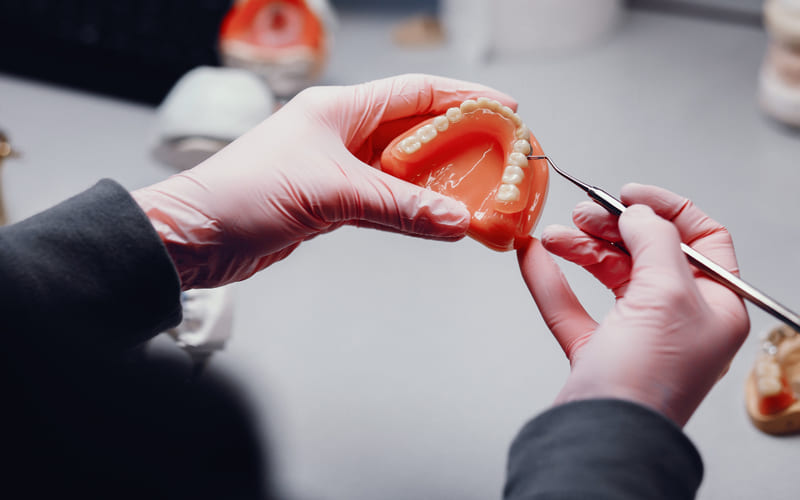Denture maintenance is critical for their long-term performance as well as your overall dental health. This blog article will compare and contrast denture relining and rebasing. Understanding these techniques will let you make more educated judgments about your dentures’ comfort, fit, and structural integrity. Let’s get started and learn about the significance of appropriate denture maintenance.
Denture Relining:
Denture relining is changing the inner surface of the denture base in order to improve fit and comfort. It is often advised when dentures become loose or painful over time due to changes in the underlying gum structure.
Denture Relining Method:
1. Evaluation:
A comprehensive inspection is performed to examine the present condition of your dentures and decide whether relining is required.
2. Impression Taking:
A specific substance is used to make a customized mold for the relining material after an impression of your gum tissue is taken.
3. Reline Material Application:
A fresh layer of acrylic material is applied to the denture base, filling the gaps between the denture and your gums, enhancing fit, and minimizing movement.
4. Adjustment and Polishing:
After the material has cured, any excess is removed, and the denture is polished to guarantee a flat surface.
Advantages of Denture Relining:
1. Increased comfort and stability
2. Improved fit as a result of improved response to gum changes
3. Denture life extensionDenture Relining Considerations:
4. As the gums vary over time, periodic modifications may be required to maintain an appropriate fit.
5. Relining may not be appropriate for highly worn-out dentures; rebasing may be a preferable alternative in this situation.
Denture Rebasing:
Denture rebasing is a process in which the complete denture base is replaced while the current artificial teeth are retained. When dentures are structurally weak or have substantial wear and tear, it is frequently suggested.
Denture Rebasing Process:
1. Evaluation and Preparation:
Your existing dentures and artificial teeth are evaluated to see if rebasing is the best solution.
2. Denture Foundation Replacement:
An imprint of your mouth is used to manufacture a new denture foundation. This new foundation is meticulously fitted to the old artificial teeth to ensure perfect alignment.
3. Trimming, adjusting, and polishing:
The rebased denture is trimmed, adjusted, and polished to obtain a comfortable fit.
Benefits Of Denture Rebasing:
1. Denture structural integrity has been improved.
2. Improved looks and usefulness without replacing the complete denture set
3. Increased denture longevityDenture Rebasing Considerations:
4. Before rebasing, a comprehensive examination is required to ensure that the artificial teeth are in good condition and can be efficiently blended with the new foundation.
5. Rebasing is often more time-consuming and costly than relining.
Comparison:
Denture relining and rebasing perform distinct functions depending on the state of your dentures. Here’s a brief example:
1. Relining focuses on fit and comfort, whereas rebasing emphasizes structural integrity.
2. Relining alters the inner surface of the denture, whereas rebasing replaces the entire base while preserving the artificial teeth.
3. Considerations: Relining necessitates regular changes, whereas rebasing is more time-consuming and costly.
Choosing The Right Option:
It is critical to consult your dentist to determine if denture relining or rebasing is the best option. Consider the following elements:
1. Denture Condition:
Relining is appropriate when the denture teeth are still in good condition. However, rebasing is preferable when the denture base is structurally weakened or badly worn.
2. Comfort and Fit:
Relining can enhance the fit and stability of your dentures if they are loose or unpleasant. Conversely, basing guarantees excellent structural integrity, which is critical for long-term operation.
3. Budget and Time:
Relining is often a less expensive and less time-consuming choice than rebasing, which requires the creation of a new denture foundation.
Denture care is critical for their durability and general dental health. Denture relining and rebasing provide potential solutions to various problems that may occur over time.
Relining is concerned with increasing comfort and fit, whereas rebasing is concerned with structural integrity. You can make educated selections to preserve the best performance of your dentures and enjoy a pleasant and confident smile for years to come if you understand each option’s differences, benefits, and considerations. Remember that periodic maintenance and visits to your dentist are essential for guaranteeing the durability and efficiency of your dentures. Consult with your dentist to find the best solution for your unique needs and to improve your denture-wearing experience.
You can also read our other article: Difference between a cosmetic dentist and a regular dentist?


